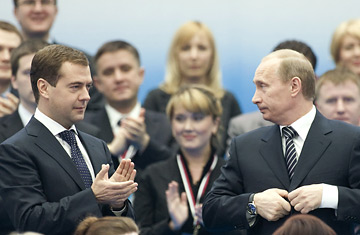
Russia's President-elect Dmitry Medvedev (L) applauds Russian President Vladimir Putin (R) during the United Russia party congress in Moscow
Vladimir Putin on Tuesday graciously accepted his nomination as chairman of the United Russia (UR) party that dominates Russia's legislature, a stepping-stone to his expected confirmation as Prime Minister on May 8. And if there was something rather Soviet about the rituals of the congress of the dominant party in Russia's legislature, the new distribution of power between Putin and his successor, President Dimitri Medvedev, is not entirely unfamiliar. Putin has made no secret of the fact that he envisages his new role as that of a head of government, nor do any observers of Russian politics doubt that Putin, rather than Medvedev, will be in charge.
In the traditions of the last century, Putin has emerged as the new "Gensek," the Russian abbreviation previously used for Secretaries General of the Communist Party. Vladimir Illyich Lenin was not the Chairman of the Supreme Soviet — the USSR's titular Head of State. That role was filled by his lieutenant Yakov Sverdlov. But the Communist Party leader, as Chairman of the Cabinet, held real executive power. The same was true of Joseph Stalin and his titular Head of State, Mikhail Kalinin. Nikita Khrushchev combined the offices of the Gensek and Prime Minister, while Leonid Brezhnev combined his leadership of the party with the role of head of state, because he desired the 24-gun salute and red carpet treatment on his foreign visits. In March 1990, Mikhail Gorbachev became the first and last President of the Soviet Union — but his power continued to derive from his position as Secretary General of the Communist party. It was the first President of Russia, Boris Yeltsin, who finally changed the power structure, putting the power in the hands of the presidency at whose pleasure the Prime Minister served.
But Putin has other plans. He became UR chairman on Tuesday without having bothered to join the party; on Monday night, the UR congress amended its charter to allow this, and the Ministry of Justice worked through the night to smooth any legal problems by Tuesday morning.
Medvedev's four-year term expires in 2012. If Putin's party does amend the Constitution, extending presidential tenure to five or seven years, as many expect, Putin might yet have his triumphant Kremlin comeback. The question is whether Medvedev's entourage might entice their man to move beyond the playground sandbox to which Putin has relegated the presidency. In the unlikely event Medvedev elects to challenge his mentor, it will quickly become clear which end of the power spectrum is dominant.
Meanwhile, Duma Speaker and, until today, UR Chairman Boris Gryzlov reminded the congress of their new chair's exalted status of "National Leader."
"The National Leader," or "Vozhd" in Russian, takes precedence over the constitutional head of state in the country's political tradition. Gryzlov pointedly used the English word "leader," rather than its Russian equivalent of Vozhd — because the Russian term is still closely associated with Stalin. The careful choice of words doesn't change the message, though. Indeed, some 70 years ago, urban legend has it that a little boy asked his father about Stalin. The father duly explained that Stalin was this country's Vozhd. "That's weird," the precocious progeny mused aloud. "I gathered from books that only primordial tribes needed a Vozhd. Civilized countries have constitutional governments."
Russia has a formally constitutional government. But it also has Putin — the Vozhd whose authority supersedes all formal structures.
